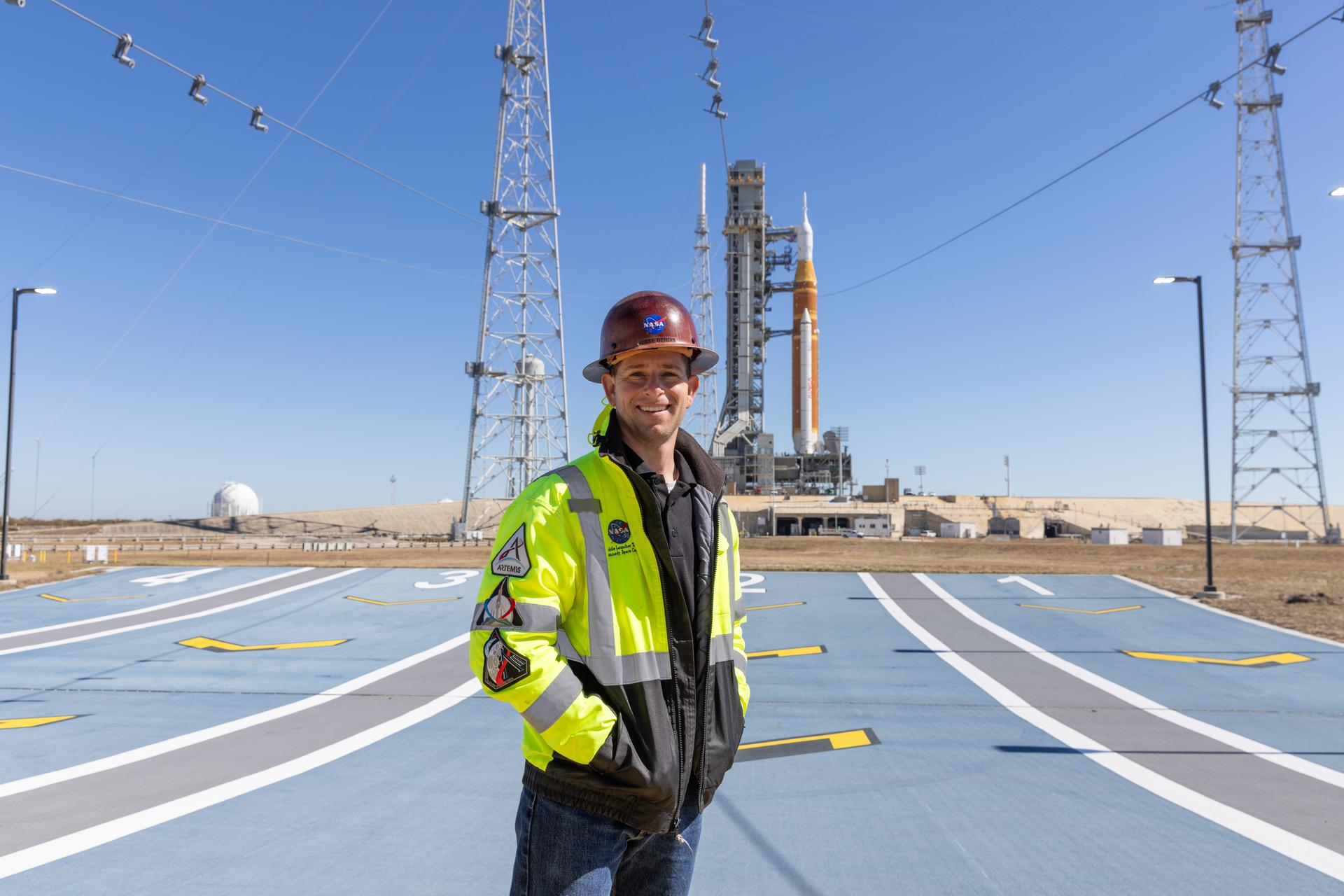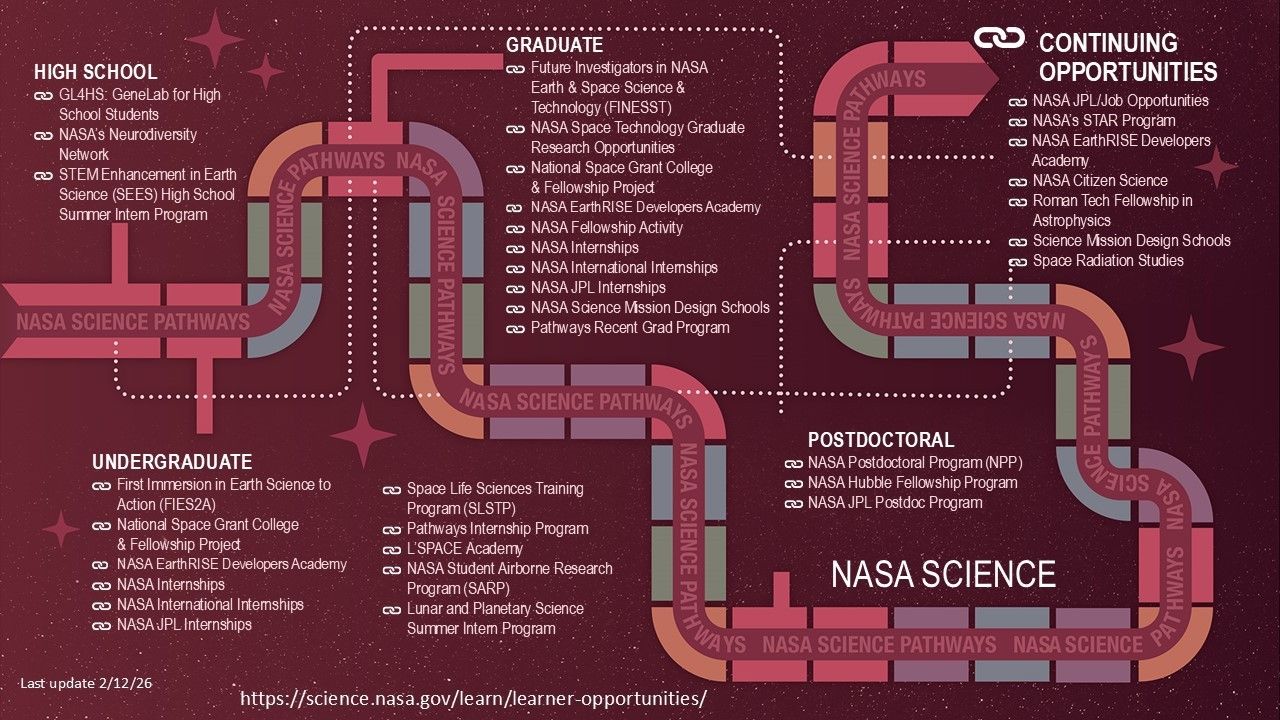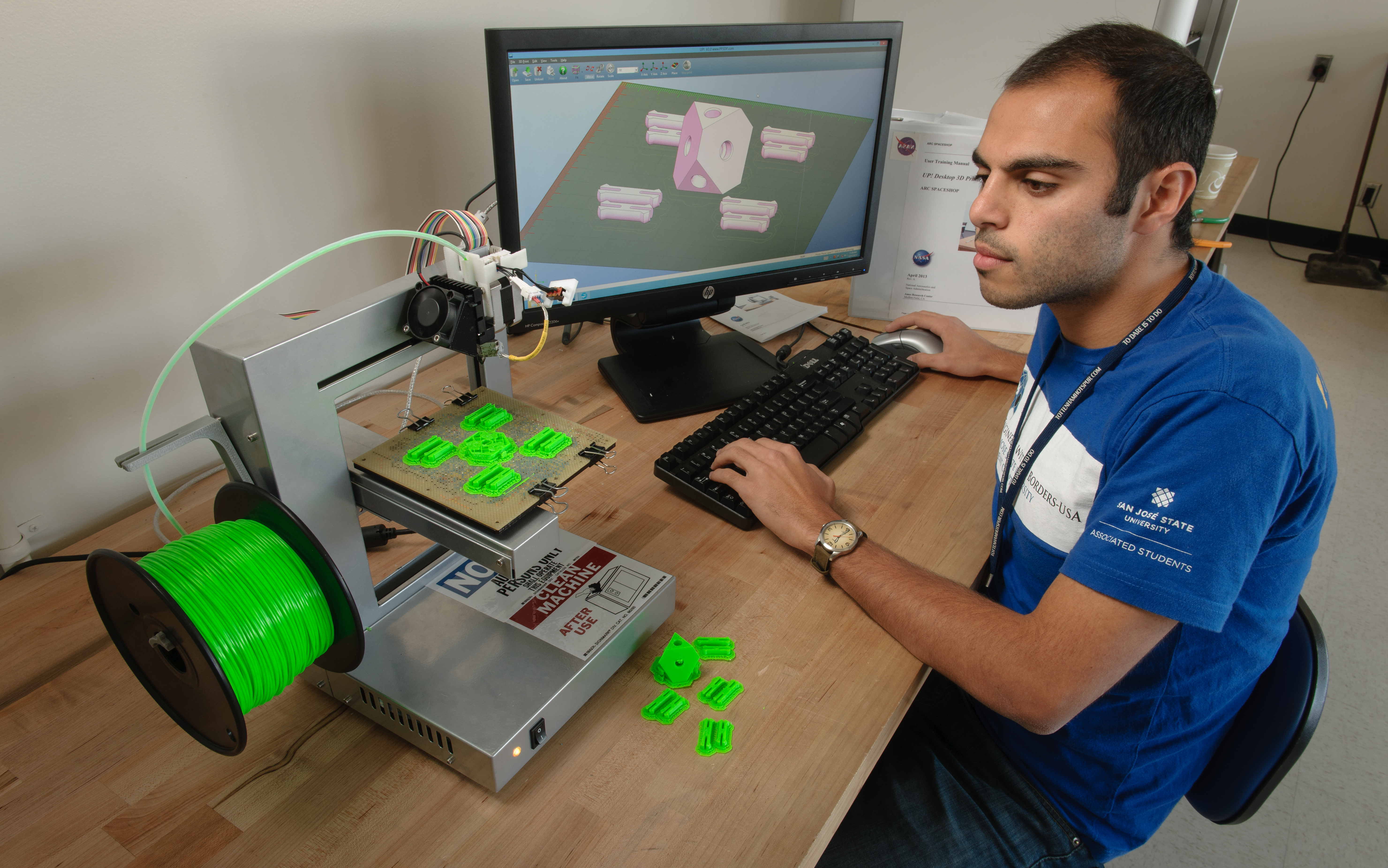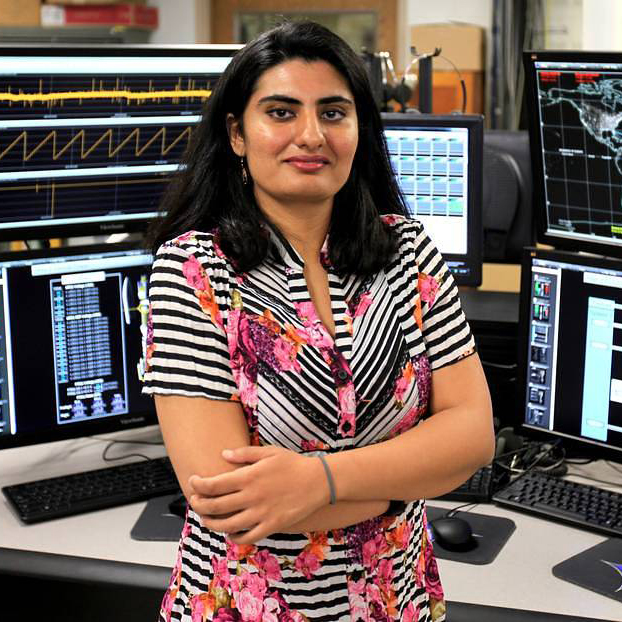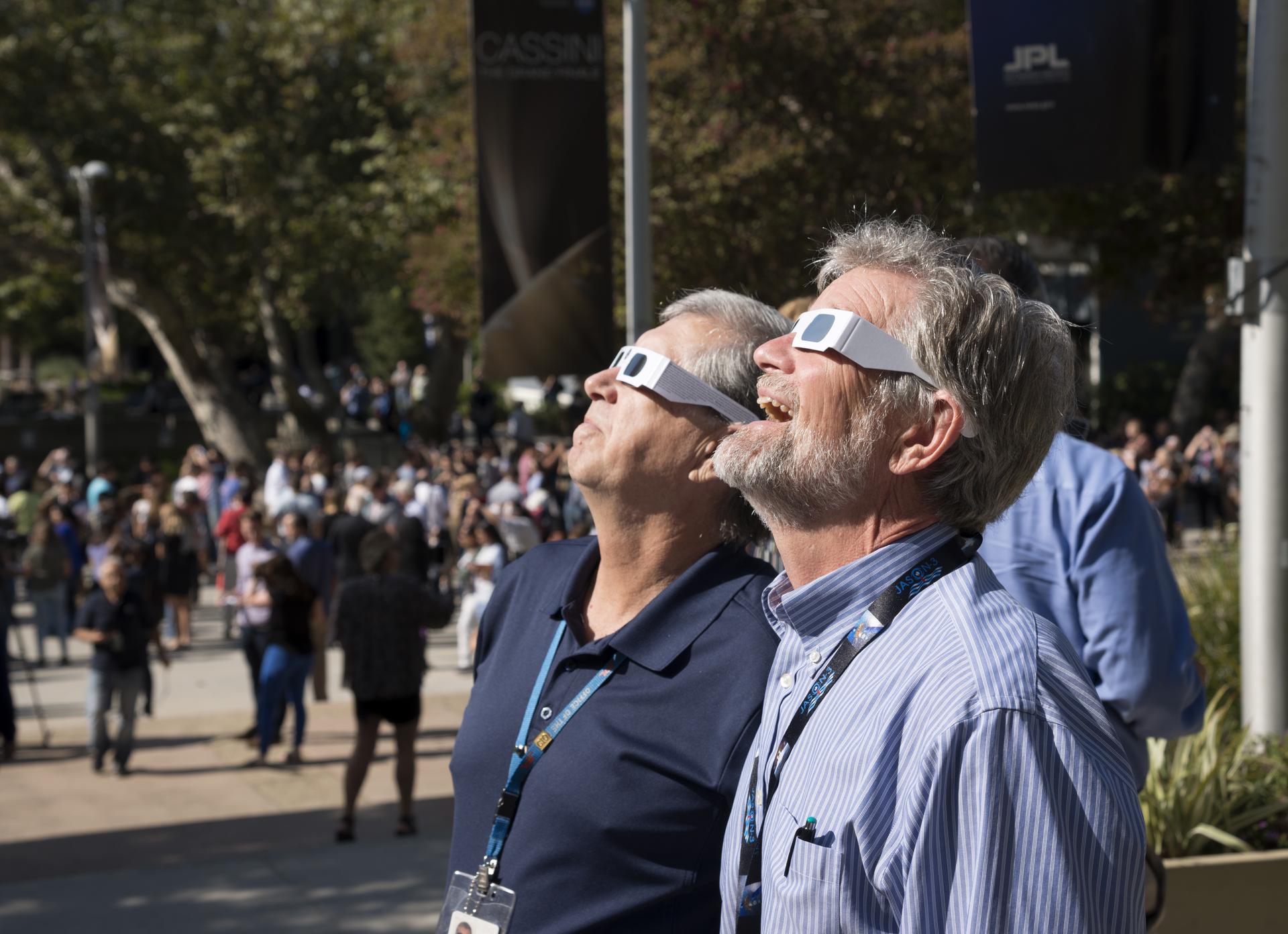Learner Opportunities
Below you will find examples of programs and scholarships for undergraduate and graduate students, internships for high school and college students, post-doctoral fellowships, special programs for early career researchers, faculty members, and senior scientists. Some of these programs occur only at NASA centers, but others support students or scientists at universities. Some are funded through NASA’s Science Mission Directorate, but many are sponsored either by other directorates within NASA, the NASA Office of STEM Engagement, or non-NASA organizations. Some programs are open to more than one group as indicated (postdoctoral, graduate, undergraduate or high school).
High School
SEES High School Summer Intern
High School Opportunities
A nationally competitive STEM program for high school students. The program provides selected students with exposure to Earth and space research. Interns will learn how to interpret NASA satellite data while working with scientists and engineers in their chosen area of work.
GL4HS: GeneLab for High School Students
High School Opportunities
GeneLab for High Schools (GL4HS) is a four-week intensive training program for rising high school juniors and seniors sponsored by NASA's Ames Research Center (near Mountain View, California). GL4HS provides students an opportunity to immerse themselves in space life sciences with a specific focus on omics-based bioinformatics research, the science of collecting and analyzing complex biological data such as genetic codes, and computational biology.
NASA's Neurodiversity Network Summer High School Internship program
High School Opportunities
A nationally competitive program for high school students who identify as autistic. Selected interns will be matched with a NASA Subject Matter Expert to work on a summer-long research project in one of the areas of NASA science. These areas include: Astrophysics, Earth and Environmental Science, Heliophysics, Planetary Science and Biological & Physical Sciences.
Undergraduate
First Immersion in Earth Science to Action (FIES2A)
Undergraduate Opportunities
FIES2A provides an opportunity for young Earth science-interested students, including community college and undergraduate students to get immersed in a workforce development opportunity at one of NASA’s Centers to conduct research focused on the Earth Science to Action (ES2A) initiatives. Research areas include looking at the atmosphere, the biosphere, the cryosphere/geosphere, the hydrosphere, and data/modeling.
The National Space Grant College and Fellowship Project
Graduate and Undergraduate Opportunities
NASA initiated the National Space Grant College and Fellowship Project, also known as Space Grant, in 1989. Space Grant is a national network of colleges and universities. These institutions are working to expand opportunities for Americans to understand and participate in NASA's aeronautics and space projects by supporting and enhancing science and engineering education, research and public outreach efforts. The Space Grant national network includes over 850 affiliates from universities, colleges, industry, museums, science centers, and state and local agencies. These affiliates belong to one of 52 consortia in all 50 states, the District of Columbia and the Commonwealth of Puerto Rico. The 52 consortia fund fellowships and scholarships for students pursuing careers in science, mathematics, engineering and technology, or STEM, as well as curriculum enhancement and faculty development. Member colleges and universities also administer pre-college and public service education projects in their states.
NASA EarthRISE Developers Academy
Undergraduate, Graduate, and Early Career Opportunities
The NASA EarthRISE Developers Academy provides 10-week research opportunities that build the next generation of science and technology leaders through an immersive, experiential model applying NASA Earth observations to real-world challenges. Participants work in teams, guided by NASA scientists and science advisors and in partnership with community organizations, to expand their research and science communication skills to address environmental concerns. Open to currently enrolled college students, recent graduates, early career professionals, and transitioning career professionals, EarthRISE Developers Academy offers both in-person and virtual opportunities. Browse eligibility requirements and opportunities on their website.
NASA Internships
Graduate, Undergraduate and High School Opportunities
Being an astronaut isn’t the only cool thing about space. Interns use their creativity and innovation to work on projects impacting NASA’s mission, such as returning to the Moon by 2024. As a NASA intern, you will be part of an amazing team that is dedicated to space exploration. You will work with leading experts and gain valuable experience as you participate in research and mission projects.
NASA International Internships
Graduate and Undergraduate Opportunities
Internship opportunities at a NASA field center university offered for students from participating countries competitive. During the internship, students work with U.S. and other foreign interns under the guidance of NASA mentors.
NASA Jet Propulsion Laboratory/CalTech
Undergraduate and High School Opportunities
An internship at NASA’s Jet Propulsion Laboratory is a chance to do the impossible. Our internships put you right in the action with the scientists and engineers who’ve helped make JPL the leading center for robotic exploration of the solar system. Our programs are as varied as the places we explore, with opportunities across the STEM spectrum for undergrads, graduate students.
The Space Life Sciences Training Program (SLSTP)
Undergraduate Opportunities
The Space Life Sciences Training Program (SLSTP) provides undergraduate students entering their junior or senior years, and entering graduate students, with professional experience in space life science disciplines. This challenging ten-week summer program is hosted by NASA’s Ames Research Center in the heart of California’s Silicon Valley. The primary goal of the program is to train the next generation of scientists and engineers, enabling NASA to meet future research and development challenges in the space life sciences. Please note: SLSTP study opportunities are available to US citizens, only.
Pathways Program
Graduate and Undergraduate Opportunities
At NASA, you have the opportunity to work and explore careers while still in school. The Pathways Program provides currents students with paid work experience and recent graduates with a dynamic career development program at the beginning of their careers.
L'Space Academy
Undergraduate Opportunities
The L'SPACE Program offers two unique, hands-on learning experiences for students: The Mission Concept Academy (MCA) and the NASA Proposal Writing & Evaluation Experience Academy (NPWEE). Students may choose one Academy to apply for each semester.
The NASA Student Airborne Research Program (SARP)
Undergraduate Opportunities
SARP is an eight-week summer program for rising senior undergraduate students to acquire hands-on research experience in all aspects of a scientific campaign using one or more NASA Airborne Science Program flying science laboratories (aircraft used for SARP include the DC-8, P-3B, Sherpa and ER-2). Research areas include atmospheric chemistry, air quality, forest ecology, and ocean biology. Along with airborne data collection, students will participate in taking measurements at field sites. The program culminates with formal presentations of research results and conclusions.
The Lunar and Planetary Science Summer Intern Program
Undergraduate Opportunities
The LPI Summer Intern Program in Planetary Science provides undergraduate students with an opportunity to perform cutting-edge research, learn from widely respected planetary scientists, and discover exciting careers in planetary science. During the 10-week internship, students have opportunities to participate in enrichment activities, including lectures and career development workshops.
Graduate
Future Investigators in Earth and Space Science and Technology (FINESST)
Graduate Opportunities
Through Future Investigators in NASA Earth and Space Science and Technology (FINESST), the Science Mission Directorate (SMD) solicits proposals from accredited U.S. universities and other eligible organizations for graduate student-designed and performed research projects that contribute to SMD's science, technology, and exploration goals. Review the latest FINESST solicitation for details by visiting https://nspires.nasaprs.com/ and search using keyword “FINESST”.
NASA Space Technology Graduate Research Opportunities
Graduate Opportunities
Through this fellowship opportunity, NASA’s Space Technology Mission Directorate (STMD) seeks to sponsor U.S. citizen, U.S. national, and permanent resident graduate student research that has significant potential to contribute to NASA’s goal of creating innovative new space technologies for our Nation’s science, exploration, and economic future. Review the latest solicitation for details by visiting https://nspires.nasaprs.com/ and search using keyword “Space Technology Graduate Research”.
The National Space Grant College and Fellowship Project
Graduate and Undergraduate Opportunities
NASA initiated the National Space Grant College and Fellowship Project, also known as Space Grant, in 1989. Space Grant is a national network of colleges and universities. These institutions are working to expand opportunities for Americans to understand and participate in NASA's aeronautics and space projects by supporting and enhancing science and engineering education, research and public outreach efforts. The Space Grant national network includes over 850 affiliates from universities, colleges, industry, museums, science centers, and state and local agencies. These affiliates belong to one of 52 consortia in all 50 states, the District of Columbia and the Commonwealth of Puerto Rico. The 52 consortia fund fellowships and scholarships for students pursuing careers in science, mathematics, engineering and technology, or STEM, as well as curriculum enhancement and faculty development. Member colleges and universities also administer pre-college and public service education projects in their states.
NASA EarthRISE Developers Academy
Undergraduate, Graduate, and Early Career Opportunities
The NASA EarthRISE Developers Academy provides 10-week research opportunities that build the next generation of science and technology leaders through an immersive, experiential model applying NASA Earth observations to real-world challenges. Participants work in teams, guided by NASA scientists and science advisors and in partnership with community organizations, to expand their research and science communication skills to address environmental concerns. Open to currently enrolled college students, recent graduates, early career professionals, and transitioning career professionals, EarthRISE Developers Academy offers both in-person and virtual opportunities. Browse eligibility requirements and opportunities on their website.
NASA Fellowship Activity
Graduate Opportunities
Each year, the NASA Fellowship Activity awards training grants to Minority Serving Institutions (MSIs) using Minority University Research Education Project (MUREP) funds. The NASA Fellowship Activity is designed to support NASA STEM Engagement objectives and to provide academic institutions the ability to enhance graduate-level learning and development.
NASA Internships
Graduate, Undergraduate and High School Opportunities
Being an astronaut isn’t the only cool thing about space. Interns use their creativity and innovation to work on projects impacting NASA’s mission, such as returning to the Moon by 2024. As a NASA intern, you will be part of an amazing team that is dedicated to space exploration. You will work with leading experts and gain valuable experience as you participate in research and mission projects.
NASA International Internships
Graduate and Undergraduate Opportunities
Internship opportunities at a NASA field center offered for students from participating countries through a competitive process. During the internship, students work with U.S. and other foreign interns under the guidance of NASA mentors.
NASA Jet Propulsion Laboratory/CalTech
Undergraduate and High School Opportunities
An internship at NASA’s Jet Propulsion Laboratory is a chance to do the impossible. Our internships put you right in the action with the scientists and engineers who’ve helped make JPL the leading center for robotic exploration of the solar system. Our programs are as varied as the places we explore, with opportunities across the STEM spectrum for undergrads, graduate students.
NASA Science Mission Design Schools
Postdoctoral, Graduate, Early Career Opportunities
NASA Science Mission Design Schools are 3-month-long career development experiences for doctoral students, recent Ph.D.s, postdocs and junior faculty who have a strong interest in science-driven robotic space exploration missions. Participants learn the process of developing a hypothesis-driven robotic space mission in a concurrent engineering environment while getting an in-depth, first-hand look at mission design, life cycle, costs, schedule and the trade-offs inherent in each.
Pathways Program
Graduate and Undergraduate Opportunities
At NASA, you have the opportunity to work and explore careers while still in school. The Pathways Program provides currents students with paid work experience and recent graduates with a dynamic career development program at the beginning of their careers.
Postdoctoral
NASA Hubble Fellowship Program (NHFP)
Postdoctoral Opportunities
The NASA Hubble Fellowship Program fosters excellence and inclusive leadership in astrophysics by supporting a diverse group of exceptionally promising and innovative early-career astrophysicists. The NASA Hubble Fellowship Program (NHFP) supports promising postdoctoral scientists to pursue independent research which contributes to NASA Astrophysics, using theory, observation, experimentation, or instrument development.
Several new appointments are made annually.
The NASA Postdoctoral Program (NPP)
The NASA Postdoctoral Program (NPP) provides early-career and more senior researchers the opportunity to work on 2- to 3- year assignments with NASA scientists, technologists, and engineers at NASA centers and the Jet Propulsion Laboratory to advance NASA's in Earth science, heliophysics, planetary science, astrophysics, space biology, aeronautics, engineering, human exploration and space operations, astrobiology, etc. missions. Visit https://science.nasa.gov/nasa-postdoc-program/ for a fuller summary of NPP.
NASA Jet Propulsion Laboratory
Postdoctoral Opportunities
The JPL Postdoctoral Program offers opportunities for research positions that provide significant training for the nation's future scientific and technological leaders. This program allows postdocs to work directly with a JPL advisor on a research topic of mutual interest. Postdocs in this program are temporary JPL employees. Applications are accepted year-round and evaluated by the advisor and their team. Appointments are for one year, renewable up to a maximum duration of three years.
Continuing Opportunities
NASA Science Mission Design Schools
Postdoctoral, Graduate, Early Career Opportunities
NASA Science Mission Design Schools are 3-month-long career development experiences for doctoral students, recent Ph.D.s, postdocs and junior faculty who have a strong interest in science-driven robotic space exploration missions. Participants learn the process of developing a hypothesis-driven robotic space mission in a concurrent engineering environment while getting an in-depth, first-hand look at mission design, life cycle, costs, schedule and the trade-offs inherent in each.
NASA EarthRISE Developers Academy
Undergraduate, Graduate, and Early Career Opportunities
The NASA EarthRISE Developers Academy provides 10-week research opportunities that build the next generation of science and technology leaders through an immersive, experiential model applying NASA Earth observations to real-world challenges. Participants work in teams, guided by NASA scientists and science advisors and in partnership with community organizations, to expand their research and science communication skills to address environmental concerns. Open to currently enrolled college students, recent graduates, early career professionals, and transitioning career professionals, EarthRISE Developers Academy offers both in-person and virtual opportunities. Browse eligibility requirements and opportunities on their website.
Space Radiation Studies
Modern astronauts are spending ever greater amounts of time in space, exposed to the little-understood effects of cosmic radiation. NASA and Brookhaven National Lab have established a joint lab—the NASA Space Radiation Laboratory (NSRL)—on the Brookhaven campus to study the possible effects of this exposure.
NASA JPL/CalTech
Explore current openings at JPL through the jpl.jobs website.
NASA Job Opportunities
Explore current openings across NASA through the USAJOBS portal.
NASA’s STAR Program
Learn to Design Biology Experiments for Space. Spaceflight Technologies, Application and Research (STAR) is a virtual NASA program for space biosciences training. The annual course targets principal investigators (PIs), senior research scientists, and postdoctoral scholars and aims to facilitate their entry to space biology and preparation for conducting spaceflight experiments using NASA and commercial platforms.
NASA Citizen Science
NASA’s citizen science projects are collaborations between scientists and interested members of the public. Through these collaborations, volunteers (known as citizen scientists) have helped make thousands of important scientific discoveries. Want to work on some real NASA science? View the latest list of projects and choose one that interests you.



